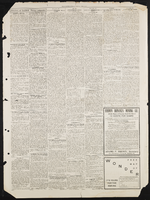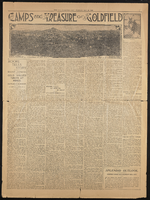Search the Special Collections and Archives Portal
Search Results

Interview with Herbert Frank York, July 18, 2004
Date
Archival Collection
Description
Text

Interview with James Keith Magruder, November 22, 2004
Date
Archival Collection
Description
Text

Interview with Richard Lawrence Garwin, July 21, 2004
Date
Archival Collection
Description
Text

Interview with Stephen Craig Ronshaugen, November 26, 2004
Date
Archival Collection
Description
Text

Interview with Joseph C. Behne, Jr., July 22, 2004
Date
Archival Collection
Description
Text

Denise Lutey oral history interview: transcript
Date
Archival Collection
Description
Oral history interview with Denise Lutey conducted by Barbara Tabach on February 27, 2018 for the Remembering 1 October Oral History Project. In this interview, University of Las Vegas, Nevada (UNLV) campus officer Denise Lutey gives an account on the night of the October 1, 2017 mass shooting in Las Vegas, Nevada. She discusses the campus security measures taken at UNLV in order to keep the campus secure and create a safe space for any survivors. She mentions the people who were involved in providing safety and resources for the survivors, including the officers and student workers. Officer Lutey also discusses the general campus response as well as the various resources offered to citizens to help them be prepared for an emergency situation, such as the Active Shooter Training provided on campus.
Text

Brittany Castrejon oral history interview: transcript
Date
Archival Collection
Description
Oral history interview with Brittany Castrejon conducted by Claytee D. White and Barbara Tabach on November 9, 2017 for the Remembering 1 October Oral History Project. In this interview, Brittany Castrejon details her experiences during the evening of the 2017 mass shooting in Las Vegas, Nevada. She describes the Route 91 Harvest Festival set-up and details the events of that night, which she experienced alongside her 14-year-old cousin and a few friends. Castrejon tells her story of trying to find safety from the chaos during the entire ordeal, eventually finding refuge for the remainder of the night at the Tropicana hotel. She ends the interview by discussing her adjustment to life after the shooting and her post-traumatic stress disorder, as well as what she has learned from the experience.
Text

Patricia Vazquez interview, November 14, 2018, June 14, 2019: transcript
Date
Archival Collection
Description
Session 1: Interviewed by Marcela Rodriguez-Campo. Barbara Tabach also participates in the questioning. Session 2: Interviewed by Rodrigo Vazquez. Monserrath Hernandez also participates in the questioning. Patricia Vazquez was born and raised in Las Vegas, NV and shares her experiences growing up in the Valley as a Queer Latina. At a young age, she remembers traveling back and forth between Mexico and the U.S. to visit family. When she started school she shares how her home language, Spanish, became her family's "secret language" as she began to learn English. During elementary school Patricia was tracked into the special education program, and remove from the mainstream classroom. She would find her love for learning in books and libraries as she taught herself how to read in English. Despite being tracked into less advanced courses, Patricia would end up taking AP/ Honors courses in high school after forging her favorite teachers signature, which changed her educational trajectory. After coming out to her family, Patricia went nearly a decade distanced from her mother and continued her college education at Arizona State University. There, she would complete a bachelors in painting and a masters in comparative literature. Her work with the Chicano Studies program at ASU helped her develop her Chicana identity and begin her involvement in social activism. In Las Vegas, she worked to fight for marriage equality and LGBTQ rights with the American Civil Liberties Union , and later with the Progressive Leadership Alliance of Nevada. She also conducted several lectures for the Latino Youth Leadership Conference on sexuality, gender, and homophobia for over a decade. She has served as an English Professor at the College of Southern Nevada for the last 20 years and is an avid hiker, traveler, and painter.
Text


